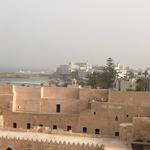Mahamoud, International development and globalization
Country of field placement: Tunisia
Canadian NGO: Alternatives
Local NGO: Tunisian Forum for Economic and Social Rights (FTDES)
As a student in the International Development and Globalization program, gaining experience abroad through a field internship is an incredible opportunity for me. Indeed, this opportunity allows us to gain not only professional experience abroad, but also life experience.
First of all, I'd say on the professional side, I was able to see on a daily basis the work of an organization that campaigns for fundamental rights such as the promotion of women in society or countering environmental degradation. Indeed, in twelve weeks with the Tunisian Forum for Economic and Social Rights, I was able to work on a number of very sensitive projects in the country, more specifically, the abusive dismissal of women in the textile industry and the migratory crisis - which represents a big problem for Tunisia. These two issues are hotly contested by many local organizations, and particularly by the population in the Monastir region, as this area is home to the majority of Tunisia's textile industries, and is also geographically located on the Tunisian coast, three hours by boat from Italy.
During my first week, I attended the Congress of Social Movements organized by my local organization, which dealt with these two themes. There were many speakers at this event: representatives of some local NGOs, the Tunisian media, women who had suffered unfair dismissals in the textile industry, women who had lost their children to maritime migration, to name but a few. I was able to understand how the migration and lay-offs of these women could greatly affect families in this region, and how these local organizations were coping to help them. As the weeks went by, I was able to work on these two themes in depth by carrying out precise research and, in particular, by creating questionnaires on these subjects.
At the same time, I was able to visit this country with its resplendent culture and unique landscapes. I was pleasantly surprised by the beauty of the latter, and also by the weather, where in winter people wear coats like in Canada. I also noticed a difference between the younger and older Tunisians. The younger population speaks less and less French than the older population. Perhaps this is due to the fact that in the Tunisian education system, the French language is less and less included. In any case, my experience in this country has been very enriching.
During my seventh week, the Tunisian president made remarks about illegal migrants which my organization FTDES described as “hateful, racist and shocking”. This statement provoked quite strong reactions from the Tunisian population and especially from legal and illegal migrants and even foreign students in Tunisia. Many of them were discriminated against by the police or even by some Tunisians. Others have been evicted from their homes, some have found themselves unemployed, and even many black students across the country have refused to leave their homes for fear of their safety.
Personally, that week, I noticed that when I walked down the street, a lot of eyes were on me, as if I was attracting attention, and I thought it must be because of my skin color. I even thought that this population that I considered open-minded was having an illogical thought which is: that a black person is surely an illegal migrant”. But fortunately the situation in the country began to calm down.
I also followed instructions for my safety from my organization, SOS International and the University of Ottawa, whose contacts we were given during the pre-internship training. This period, which strongly affected social life in the country, motivated me to work more with my local organization on the theme of migration. Indeed, I had the opportunity to interview eight people, including six illegal migrants in Tunisia, about the situation and their journey to Tunisia. Some of their testimonies were very surprising to hear, and you quickly realize how lucky we are compared to some others in the world. In particular, I had the opportunity to film a participant's account of his hostile journey.
Finally, I'd really like to thank the University of Ottawa, Alternatives and the Tunisian Forum for Economic and Social Rights for this enriching and unforgettable experience. It taught me a great deal both professionally and personally. I also hope one day to see again my colleagues and the wonderful people I met there.
In any case, this is just a farewell. Aslama!

